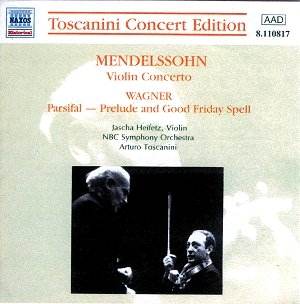Two of the most autocratic and demanding musicians
of the recorded era join in a Studio 8H NBC performance of the Mendelssohn
Concerto. Heifetz was to record the concerto commercially a few years
later, in 1949, with Beecham and the RPO as well as the February 1959
traversal in Boston with Munch. The former was an edgy, rather unsympathetic
affair and the latter not much better but both were immeasurably superior
to the live Cantelli performance, a lamentable fight to the death won,
if that’s the right word, by the violinist finishing at least a bar
ahead of the orchestra. No such underhand manoeuvring afflicts the Toscanini
performance but equally in this most exacting of all violin concertos
(not necessarily technically or in terms of aristocratic or philosophical
address but rather in matters of expressive nuance) there is little
real musical satisfaction.
The confluence of febrile intensities exemplified by
Toscanini and Heifetz works best in the inner movement; elsewhere their
combustibility comes at too high a price. The passagework in the opening
movement is very – sometimes viciously – fast. Even when Heifetz deigns
to relax there is something insistent about his playing that militates
against the subject matter. Of course much here is glittering and superb
but equally and damagingly not all of it sounds Mendelssohnian. Some
of his expressive pointing is fabulous but his energy and propulsion
sound too daemonic for comfort. In the Andante though one appreciates
his expressive lyricism – Heifetz was consistently sympathetic in this
movement, which makes his virtuoso inclinations in the outer movements
all the more regrettable - and the ardour of his playing is especially
effective. Toscanini conducts here with shading and nuance and adds
some audible groans of his own. Some overloading afflicts the finale
- fortissimi timpani suffer badly - as does the sense of braying drive.
I liked the way Toscanini convincingly brought out some string counter-themes
but the final few bars are surely far too military. Not a performance
that, except for the Andante, will live long in the memory.
The coupling is Parsifal. The grandeur of the music
is certainly not enhanced by the cramped and problematical nature of
the recording venue – whilst much here is spacious and noble and admirable
much equally is lost. So all in all, with short playing time, even at
superbudget price, this Toscanini Concert Edition comes with a caveat.
The recorded sound is a problem, especially in Parsifal, and Heifetz
and Toscanini are brusque and frequently showy in the Mendelssohn.
Jonathan Woolf

